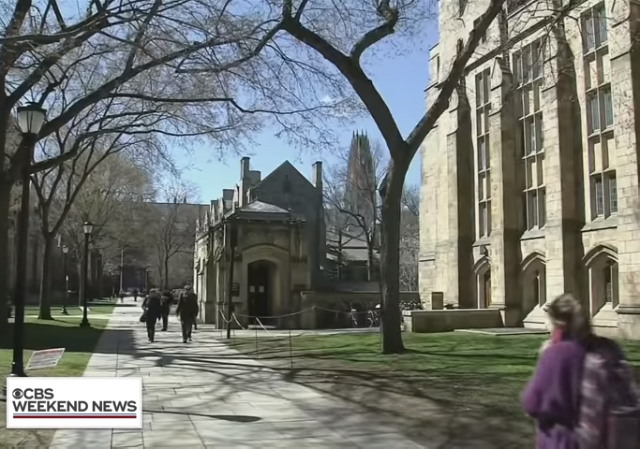“The US University System is Beginning to Molder”
“The problem is not just a few glitches here and there.”

Higher education in the United States is no longer what it used to be. Everyone knows it, and a reckoning is coming.
Adrian Wooldridge writes at Bloomberg:
America’s Educational Superpower Is Fading
The United States has been a leader in higher education since the Massachusetts legislature founded Harvard College in 1636, six years after the Puritans landed and established the Massachusetts Bay Colony. The Americans built the world’s first mass university system with the creation of land-grant universities via the Morrill Acts of 1862 and 1890. They mixed the world’s two most successful models of higher education — the German research university and the Oxbridge residential college — into a uniquely powerful synthesis in the 1890s. The 20th century has seen the US invent the high-tech research park, the multiversity, the commuter college and, cynics might add, the university as hedge fund.
In many respects the US remains the global pacemaker today. American universities occupy 19 of the top 30 slots in the 2023 Times Higher Education Supplements’ ranking of the world’s universities. The US has by far the largest concentration of Nobel Prize winners. Nine of the top ten richest universities are in the US (the odd man out is the King Abdullah University of Science and Technology in Saudi Arabia). Harvard University’s top ranking on that list, with an endowment of more than $50 billion, didn’t prevent Kenneth Griffin, the founder and CEO of Citadel (and a voluble critic of academic leftism), from writing a check for $300 million.
Yet behind this glittering façade of Nobel Prizes and gargantuan gifts, the US university system is beginning to molder. The problem is not just a few glitches here and there. That is to be expected in a giant system. It is that vital elements in a healthy academic system are failing at the same time. Prices continue to rise: A year at Cornell now costs nearly $90,000. Administrative bloat is rampant: Yale University now has the equivalent of one administrator for every undergraduate student. Federal student debt has reached $1.6 trillion, 60% more than credit card debt.
Hat tip:
"Yale University now has the equivalent of one administrator for every undergraduate student." https://t.co/26uklyiHNo via @opinion
— Bruce Mehlman (@bpmehlman) April 18, 2023
 DONATE
DONATE
Donations tax deductible
to the full extent allowed by law.








Comments
“Beginning to …?”
I’m reminded of Peter Drucker responding to an ask for predictions for the 21st century (paraphrasing): “I don’t make predictions. Sometimes, I describe things that have already happened, that people haven’t noticed yet.”
History rhymes, right?
In 2023, Americans are behaving a lot like Europeans in the 1930s, as Naziism rose and spread.
The educational system is just one component of the rot.
For the vast , vast majority of American families, it is just foolish to imagine that almost any American university has anything useful to offer you, going forward. Regardless of the $$$.
People don’t want to accept the reality of what’s going on.
It’s sad. I would have thought that a lot more families would have walked away from these silly overpriced overhyped institutions by now.
To shell out tens of thousands for what these places offer … it’s just foolish.
And for almost anybody to take on debt to attend virtually any American college? Idiotic.
There are many better options.
– – – – –
Human behavior is interesting : No matter how many signs and warnings of what’s happening and what’s coming, a lot of people insist on the “Everything is fine, let’s just keep on doing what we’ve always done” approach to life.
🤷♂️
Academic credentialism still runs rampant among American employers. I see plenty of engineering job postings that say, essentially, “if you didn’t go to an Ivy, MIT, Stanford, or equivalent, don’t bother us”. They are not interested in the best talent, they are interested in the most well-credentialed talent. Who management seeks to impress is unclear.
Those employers basically want Woke Certifications.
With rare exceptions, the moldering US university is as useful as a rotary phone.
Or a fax machine.
People really need to wake up.
The internet has changed things.
Nobody needs to spend four years in some isolated college-town … before beginning to take on the real world.
The people who teach at these schools know this themselves. But you cannot expect them to tell you the obvious. They don’t want to lose their jobs, after all.
– – –
C’mon America: It’s ok to live in reality. In fact, it’s better!
👍
Smolder?
In my observation and opinion, the US education system has been moldering at least since the early sixties. By then (and probably earlier) college education had become the sale of credentials and personal associations, rather than knowledge.
If there’s a job opening for a piano player, it seems to me the job offer will go to the pianist who plays most proficiently — regardless the applicant’s music school , or other credentials.
Regardless of credentials, if you cannot do a job very well, why would anybody continue to pay you to continue to do that job?
In order to live an independent, adult lifestyle, one must have skills that customers or employers will pay you for. Duh. For the vast majority of Americans, American colleges aren’t the place to acquire such skills.
(Roughly half the people who take out college loans are unable to repay them!!! That alone should convince any sane person of the true value of American colleges.)
The real question is how long can higher education command the donor base that it has cultivated for the last 200 years?
My prediction; A long time. And additional tax benefits are around the corner as soon as the schools begin to suffer.